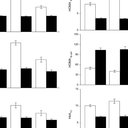Cytotoxicity of alkaloids isolated from Peganum harmala seeds.
Ključne riječi
Sažetak
BACKGROUND
Peganum harmala is used in traditional medicine to treat a number of diseases including cancer. Our preliminary studies show that the alkaloidal extract of PH seed is cytotoxic to several tumor cell lines in vitro and has antitumor effect in a tumor model in vivo. The present investigation was aimed at extending our previous studies in identifying the components in P. harmala seed-extract responsible for the cytotoxic effects, and study the cytotoxic and antiproliferative activity of isolated alkaloids and total alkaloidal fraction (TAF) in several tumor cell lines. Four alkaloids: harmalicidine, harmine, peganine (vasicine) and vasicinone were isolated from the P. harmala seed-extract and their activity and that of TAF were tested a) for their cytotoxic activity against four tumor cell lines [three developed by us by chemical-induction in Wistar rats: 1) Med-mek carcinoma ; 2) UCP-med carcinoma ; 3) UCP-med sarcoma] ; and 4) SP2/O-Ag14, and b) for antiproliferative effect on cells of Jurkat, E6-1 clone (inhibition of incorporation of {(3)H-thymidine} in cellular DNA). The alkaloids and TAF inhibited the growth of tumor cell lines to varying degrees; Sp2/O-Ag14 was the most sensitive, with IC50 values (concentration of the active substance that inhibited the growth of the tumor cells by 50%) ranging between 2.43 μg/mL and 19.20 μg/mL, while UCP-med carcinoma was the least sensitive (range of IC50 = 13.83 μg/mL to 59.97 μg/mL). Of the substances evaluated, harmine was the most active compound (IC50 for the 4 tumor cell lines varying between 2.43 μg/mL and 18.39 μg/mL), followed by TAF (range of IC50 = 7.32 μg/mL to 13.83 μg/mL); peganine was the least active (IC50 = 50 μg/mL to > 100 μg/mL). In terms of antiproliferative effect, vasicinone and TAF were more potent than other substances: the concentration of vasicinone, and TAF needed to inhibit the incorporation of {(3)H-TDR} in the DNA cells of Jurkat, E6-1 clone by 50% (IC50) were 8.60 ± 0.023 μg/mL and 8.94 ± 0.017 μg/mL, respectively, while peganine was the least active (IC50 >100 μg/mL). The IC50 values for harmalacidine (27.10 ± 0.011 μg/mL) and harmine (46.57 ± 0.011 μg/mL) were intermediate. The harmala alkaloids inhibited the growth of four tumor cell lines, and proliferation of Jurkat cells with varying potencies. Harmine was the most potent in inhibiting cell growth, and vasicinone was most active as antiproliferating substance. The TAF had significant cytotoxic as well as antiproliferating activity.



